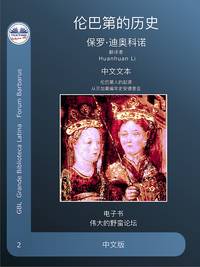
Полная версия
History Of The Lombards
21.
But Tatone could not rejoice much of this triumph, shortly after he was confronted and killed by Wacone son of his brother Zuchilone, therefore Wacone had to face Ildichi, son of Tatone. Wacone also defeated Ildichi who was forced into exile and took refuge with the Gepids where he lived until his death. For this reason a long enmity was born between Gepidi and Longobardi. Also in these times Wacone attacked the Swabians and subdued them. If anyone doubts this, reread Rotari's edict on Lombard laws and in almost all the codes he will find what we have said in this little story.
Wacone had three wives: the first, Ranecunda, was the daughter of the King of the Thuringes, then married Astrigosa, daughter of the King of the Gepids, and from this he had two daughters, Wisigarda, who went to the wife of Teodeberto King of the Franks, Salderada, the another daughter married Cusupaldo, another King of the Franks, but he took her in hatred and married her to a man, such a Gariboldo. Wacone then had a third wife, Salinga, daughter of the King of Eruli, this gave Wacone a son whom he called Waltari. Upon Wacone's death, Waltari became the eighth Lombard king. All these kings were Lithingi, a noble Lombard lineage.
22.
Waltari held the kingdom for seven years before he died, after him the ninth king to conquer the kingdom was Audoino who shortly afterwards brought the Lombard people to Pannonia.
23.
The hostility between Gepidi and Longobardi finally came to the point and the war was being prepared on both sides. Then came the day of battle, the sides faced each other fiercely and neither of them could prevail over the other. It happened that, in the middle of the fray, Alboino son of Audoino and Turismondo son of King Gepido Turisindo met, Alboino, hitting him with the sword, made him fall from the horse and killed him, the Gepids, seeing the son of their dead King, they lost heart. Moreover, Turismondo sustained most of the fatigue in battle, so in short, the Gepids fled. The Lombards pursued them fiercely, routing them and killing as many as they could, then went back to take the spoils from the dead. After taking full advantage of the victory, the Lombards returned to their headquarters and suggested to King Audoino to invite Alboino, who with his valor had obtained the victory, just as he had been his father's companion in danger, as he was in banquet. Audoino replied that he could not do it so as not to break the tradition of his people: "You know," he said, "that among us it is not allowed for a son to sit in conviviality with his father if he has not first received weapons as gifts from a Foreign King ».
24.
Having heard these words from his father, Alboino took only forty warriors and went to Turisindo, King of the Gepids, the one with whom he had fought in the war just before, and explained the reason for the sudden visit. The latter welcomed him with benevolence and made him sit on his right where Turismondo, the son who recently died in battle, used to sit. So it happened that while the variously laid table was filling up with food, Turismondo was overwhelmed by the thought of his dead son who used to sit in that place where his killer was now standing, so finally, after taking deep breaths, he gave voice to his pain and he said: "This place is dear to me, and it is bitter for me to see who is sitting there today." Then, stimulated by the words of his father, the other son of the King, who was present in the room, began to insult the Lombards with insults, mocking their custom of covering the lower leg with small white bands, "they are like those mares they have knee-white feet, "he said." The mares you look like are good for nothing. " To these words a Lombard replied: "Go to the Asfeld field and you will have proof of how much they kick these mares of which you speak; where your brother's bones lie scattered, like those of a mare that is worthless. " Upon hearing this, the Gepids, not enduring humiliation, blazed with anger and tried to avenge the injury. The Lombards, before them, put their hand to the hilt of swords ready to fight but the King, jumping from the table, stood in the way, keeping his own from anger and from fighting and threatened to punish who would start the battle first, and also that "God does not like the victory of those who kill the guest in their own home". In this way, she resumed her banquet with a happy heart. Turisindo took the arms of his son Turismondo and gave them to Alboino and sent him unharmed to his father's kingdom. Returning from his father, Alboino since then became his guest and while receiving the sumptuous treatment of the Kings, he told, in an orderly way, all that had happened to him at the Gepids in the palace of Turisindo. Those present were admired and praised both the audacity of Alboino and the noble loyalty of the King Gepide.
25.
In this period Justin Augustus prosperously held the Roman Empire, he successfully ended many wars and also left his mark in civil legislation. With the patrician Belisarius he definitively defeated the Persians and, always by the work of General Belisario, he cancelled, exterminating them, the lineage of the Vandals capturing also their leader Gelismero. So he regained the Roman Empire, after ninety-six years of barbarian rule, and all of Roman Africa. Then, still with the value of Belisarius, he defeated in Italy the lineage of the Goths, also here he captured their King Vitige, and then again the Mauri with their King Amtalan, who infested Africa. Always with the war he also subdued other people and for this he deserved the title of Alamannic, Gothic, Frankish, Germanic, Ancient, Alanic, Vandalic and African. He put order in the laws of the Romans which had become too long-winded and often useless and contradictory, abolished the numerous promulgations of the many principles that had preceded him in only twelve books and called this volume the Justinian Code. Even the laws of individual magistrates and judges, who reached almost two thousand books, ordered them in fifty and called this work the Digest Code or the Pandette. In a new form he composed the four books of the institutions which contain the general principles of all the laws. He also ordered that the new laws enacted by him be collected in a volume and called it the Code of Tales. Within the walls of Constantinople he had a temple erected at Chrysostom, at the Wisdom of God the Father and called it with the Greek word Agian Sophian, or Saint Wisdom. The construction is magnificent and daring, so much so that nowhere in the world can one see such. Justinian was Catholic, righteous in working and righteous in judgments, and that is why he did everything well. Under his reign, near Rome, Cassiodorus lived, excellent both in human science and in divine things, in particular he composed, with a high spirit and acute interpretation, the darkest Psalms. Cassiodorus was first consul, then senator and finally monk. In the same period, the abbot Dionigi also settled in Rome and calculated the Easter cycle with great skill. And yet, Prisciano understood the most profound laws of the art of grammar and Aratore, subdeacon of the church of Rome, put the acts of the Apostles in hexameter verses.
26.
At the same time our blessed father Benedetto also shone for the merits of his extraordinary life and apostolic virtues, first in Subiaco, a place forty miles from Rome and then in the citadel of Cassino also called "La Rocca". As is known, the Blessed Pope Gregory in his Dialogues drafted his biography with beautiful style. I too, in my own small way, have listed his miracles in "elegiac meter" one by one, arranging them in the individual couplets as follows:
Whence I will begin with your triumphs, O blessed saint
with the accumulation of your virtues whence will I begin?
Glory to you, blessed father, who reveals your merit with the name itself!
Shining light of the century, Glory to you, blessed!
Norcia, how much you can join the praise, or you exalted for those who, so great, you raised;
O you who bring the sun to the world, Norcia, how much you can join in praise.
O boyish decoration, which transcends its years with costumes
And the old men overtake, or boyish decorum!
Your flower, O paradise, did not care for what is blooming in the world,
Your flower did not cure the splendour of Rome, o paradise.
Bitterly the nurse gathers the pieces of the broken vase,
Pleased can return the nurse's recomposed vase.
Those who have the name of Rome hide the recluse among the rocks;
he who has the name of Rome offers the help of his pity.
From Lauds to you, Christ, the caves hidden from all mortals resound;
But you know them well, the lairs of Lodi resound to you.
The colds, the freezing winds, the snows animatedly endured for three years;
In love for God do not cure colds, freezing winds, snows.
Deception by veneration is accepted, thefts that inspire piety are praised;
Since man consecrated to God has nourished himself with it, deception is accepted.
It gives the signal that food has come, but the bruise wants to oppose;
Nonetheless, the other faith gives the signal that food has come.
According to the rite, those who listen to Christ celebrate the feast;
By feeding those who fast, according to the rite, they celebrate the feast.
Greedy shepherds bring welcome sustenance to the cave
But they bring back pleasing food to soothed souls.
Fire extinguishers fire, while the flesh tears the brambles;
The carnal fire is extinguished by the celestial fire.
An unjust death is hidden, but from afar he warns it shrewd;
The unjust death hidden does not bear the weapons of the cross.
They correct the mind that wanders slight rods and discipline it;
Slight rods close out the plague that is wandering.
A stream of perennial water flows from the native rock;
the arid hearts irrigate the wave of perennial water.
At the bottom of the whirlpool you had come down, fold like a scythe detached from the handle;
it rose to the surface, leaving the bottom of the eddy.
Dropped into the water while waiting for his father's order, he survives;
runs on the water, while waiting at the order of the father.
The wave led the way to those who were ready for the master's order;
to those who did not know where he was running, the wave made the road.
And you, little child, are drawn on the wave and do not drown;
and intervene, true witness too, little boy.
The perfidious hearts stirred by evil stimuli are attracted;
inflamed from hell perfidious hearts become sad.
The crow takes the food offered to him by benign hands;
and in command takes the deadly food away from the crow.
It pains the holy heart that his enemy died in the fall;
through the guilt of the disciple the holy heart hurts;
On the pleasant banks of the glorious Liri guides accompany you;
from heaven you fell to the pleasant banks of the Liri.
Iniquitous snake, you rage stripped of the woods and the area;
for the peoples you have lost, O unjust serpent, you are raging.
Evil you are on top, go away: let the marble be placed on the walls;
His order bends you: go away, wicked you're on.
You can see a voracious fire rising with false flames;
but you, shining Gemma, do not see that voracious fire.
As he pulls up the wall, his brother's bowels torn;
The brother comes back to safety as he pulls up the wall.
What has been done in secret appears, the gluttons are revealed;
the fact appears secretly.
Ferocious tyrant, the nets of your deception are in vain.
receive a brake on your life, fierce tyrant.
The high walls of Nuka by no enemy will be torn down;
a whirlwind - he says - knocks down the excellent walls of Numa.
You are beaten by the fierce enemy, because you do not offer the sacred gift to the altar;
You offer the sacred gift to the altar; you are beaten by the fierce enemy.
In the future he sees every enclosure of the flock given to a lineage;
but that same lineage rebuilds every enclosure of the flock.
O servant friend of fraud, you are screwed by the serpent's enticements;
but you are not prey to the serpent, a servant friend of fraud.
Silent mind, keep quiet: do not murmur of those who see silent thoughts;
everything is revealed to the prophet; shut up, mind proud.
Foods brought down from heaven cast out black hunger;
and at the same time the black hunger of the mind is chased away.
All hearts are amazed that you without a body are present;
that you in view disturb, the hearts are all amazed.
At the command of the voice they try to stop the tongues;
they flee the sepulchre under the command of the voice.
they are not allowed to remain in command during the rite;
together with the sacred rites in command of the voice.
The earth is split and the buried body is rejected from the womb;
at your command the broken earth holds the body in its womb.
The perfidious dragon seduces the fugitive to hurry;
but the evil dragon blocks the forbidden path.
A deadly disease has shaken the gold catkin of the head;
at his command he escaped g and the deadly disease.
Merciful he promises to those who need it the fawn metal without having it;
by the work of heaven the pitiful finds the metal fawn.
You, worthy of compassion, Chuli spot snakeskin poisons;
get your skin intact as before, or worthy of compassion.
Fans bounce the rugged rocks off the glass, nor can they break it;
the harsh rocks remain intact the glass.
Why dispenser, hesitate to offer a drop of the jar?
Look: the jars are overflowing. Why do you hesitate?
How can you have medicine that you have no hope of salvation;
You who always give death, how can you have medicine?
Ah, miserable old man, you fall upon the blows of the enemy;
but suddenly you come back to yourself, old miserable.
The barbarian's ropes shake innocent hands;
The barbarian's ropes are united by themselves.
That superb horse screams threatening cries,
prostrate on the ground lies that superb horse.
Around the neck the father carries the beloved body of the extinct son;
the father carries the alive son around his neck.
Everything wins love: with the rain he bound his sister the blessed;
sleep stays away from the eyelids, everything wins love.
Accept for its simplicity, fly into the sky like a dove;
Reaches the kingdom of heaven, for its simplicity.
Or embraced God, to whom the whole universe is revealed,
you that the arcane manifest.
In a sphere of fire the righteous one rises into the ether;
to which a sacred love burned or a sphere of fire closes.
Three times called came who must witness the prodigy;
precious for the love of his father, three times called he comes.
O good leader, who by exhorting to fight reinforces the spirits by example
I throw you first among the weapons, good leader, exhort to fight.
Sufficient signs he did leaving common life;
rushing to life, he made suitable signs.
A regular psalmist, he never gave rest to his plectrum;
singing to God the assiduous psalmist died.
Those who had only one heart, encloses the same sepulchre;
The same glory surrounds those who had one heart.
A splendid street appeared, lit with corpuscle torches;
a way by which the splendid ascent Saint appeared.
Reached the rocky fence, in his rambling he gets salvation;
escapes his rambling, reached the rocky fence.
Poor verses composed the supplicant servant on offer;
exile, poor, weak, poor verses he composed.
Accept they are, please, or guide them to the path of heaven;
O Father Benedetto, please accept them.
We also composed a hymn in the "iambic meter Archilochus", which contains the individual miracles of the same Father Benedict:
Briskly, Brothers, Come;
in Chorus we join in singing;
we live the joys of this
radiant holiday.
On these days Benedict
showing us the arduous path,
our father, went up to the golden kingdom,
taking the prize for his work.
As a new star shone,
that clears the mists of the world.
Still on the threshold of life
escape from the flowering meadows of the century.
Powerful to work miracles,
by the breath of God inspired,
shone by wonders and predicted
what the future held.
Intended to feed many,
reconstitutes the sieve of the wheat;
choosing for himself narrow prison,
fire extinguishers with fire.
With the weapon of the Cross he breaks
the cup that carries the poison;
discipline the wandering mind
with the mild scourge of the body.
Flow streams from the rocks;
iron returns from the bottom of the water;
obeying runs on the waves;
with a mantle the child escapes to death.
The hidden poison is revealed;
the winged executes the commands.
A collapse crushes the enemy;
the roaring lion comes back.
The motionless stone becomes light;
the imaginary stake disappears.
Those who were shattered are healthy;
the abuse committed elsewhere is revealed.
Shrewd king, you are exposed;
unjust that you oppress, you are put to flight.
You are already known, events of the future;
your mysteries no longer hide, O heart.
The foundations are laid in the dream;
the earth rejects corpses.
The fugitive is formed from the dragon;
coins rain the ether.
The crystal resists rock;
the jars are overflowing with oil.
Your sight melts the chains;
the dead come back to life.
The power of such a great light
it is overcome by the desire of the sister
the more one loves, the more to force
that he sees flying to the sky.
A splendour shines in the night
unknown to the people first;
the whole globe can be seen in it,
and in the flames the Saint jump.
Among these things he made it clear with his pick
admirable realities, similar to nectar;
in fact he drew a precise line
of consecrated life for the followers.
But you, now a powerful guide for your children,
be propitious to the sighs of the flock;
blaze it for good and beware of the snake
to follow you in your path.
I want to report here about a fact that Blessed Gregory does not mention in the life of St. Benedict, our founding father. When, by divine inspiration, he came from Subiaco to these places where he now rests, he was followed by three crows that he used to feed, they flew around him for fifty miles. Arriving here at a crossroads, two angels appeared in the form of young men to show him the way to take. Always here lived a Servant of God in a humble hut to which heaven had said: "Take care of these places, another friend is here". Arriving here, in the Rocca di Cassino, Benedetto mortified himself in a severe and continuous abstinence, above all, in the time of Lent he lived a retreat, away from the worries of the world. I found these news in the song of the poet Marco, who came to visit Benedict and composed some verses in his praise, I don't report them below because I don't want to lengthen my story too much. Heaven was surely the one who led Benedict to this fertile place under which a luxuriant valley lies: he wanted a congregation of many monks to meet here, just as it actually happened, thanks to the guidance of God.
Once I have finished narrating these things, which I could not leave out, I return to our story.
27.
Audoino, King of the Lombards, had Rodelinda as his wife, this generated a son, Alboino, suitable for war and valiant in action. Died Audoino, the tenth king was therefore Alboino who became him with the votes of all. The many exploits of Alboino made him famous and Clotario, King of the Franks, wanted to join him by giving him his daughter Clotsuinda as wife, from this union only a daughter was born, Albsuinda.
At the same time Turisindo, King of the Gepids, died, followed by Cunimondo. The latter, wanting to avenge the old wrongs suffered, broke the peace treaty with the Lombards and prepared the war. Alboino had made a perpetual pact with the Avars, those who were once called Huns and only later Avars, named after their King. Alboino left for the war provoked by the Gepids and while the latter, from various directions, moved against of him, as per agreements made with the Lombard King, the Avars invaded the territory of the Gepids. A sad messenger reached Cunimondo with the news that the Avars had entered their lands. Depressed in morale, faced with an anguished choice, Cunimondo decided to face the Lombards first and urging them to battle added that after winning them they would drive the Huns out of their homeland.
The inevitable battle was waged with all forces, the Lombards were victors and cruelly raged on the Gepids with such fury that they massacred them almost completely, so much so that those who brought the news of the extermination barely escaped. In that battle Alboino killed Cunimondo and, taking his head off, made a glass to drink, on the type of what are called "scala" with them and "patera" in Latin. He also took prisoner the daughter of King Gepides named Rosmunda and a multitude of men and women of all ages. Alboino, given that Clotsunda had died, took Rosmunda as his wife to his future ruin, as it became clear. With that victory the Lombards collected a great wealth. The lineage of the Gepids was destroyed, those who escaped ended up subject in part to the Lombards and in part under the harsh yoke of the Hun empire that still occupies their homeland.
The name of Alboino, however, rose to great fame, so much so that at Bavari, Sassoni and other men who speak the same language, his deeds, luck in war, valor in battle and glory are told. Under his rule, the Lombards also manufactured many new weapons of particular shape as is still told today.
End of the First Book
Second book
1.
While the fame of the continuous victories of the Lombards spread everywhere, Narsete, "Cartulario Imperiale" and governor in Italy, was busy preparing the war against Totila the Goth. Having already been the federated Lombards of the Empire, Narsete sent ambassadors to Alboino asking him to provide an auxiliary contingent for the imminent war against the Goths. Alboino sent a contingent of selected men who arrived in Italy by crossing the Gulf of the Adriatic Sea. These allies of the Romans took part in the battles by defeating and exterminating the Goths, also killing King Totila, honoured and full of gifts, they returned to their lands.








